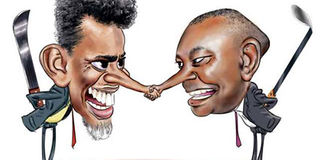Attempts by DPP, DCI to create perception of unity flops badly

That the once formidable partnership between Noordin Haji and George Kinoti is under stress is no longer a secret. ILLUSTRATION | JOHN NYAGAH | NATION MEDIA GROUP
What you need to know:
Mr Kinoti and Mr Haji were appointed two months apart, in January and March 2018, respectively.
When they finally hit the ground running, the whole country felt their presence.
- Fridays became a nightmare for those suspected of involvement in corruption.
But over time, the Friday arrests have drastically reduced amid criticism of the DPP and DCI that they are being used to settle political scores.
That the once formidable partnership between Director of Public Prosecutions (DPP) Noordin Haji and Director of Criminal Investigations (DCI) George Kinoti is under stress is no longer a secret.
In its place, those old good days have been replaced by public spats, including a scathing media interview that Mr Kinoti gave in which he accused the DPP’s office of betrayal and then turning up in public to put up a show of unity amid unease and simmering tensions between officers of the two institutions.
The accusation that the DPP is frustrating his office came a day after an attempt by the DCI to charge Kenya Ports Authority managing director Daniel Manduku and Kenya Revenue Authority commissioner for customs Kevin Safari collapsed, embarrassing the DCI, which had arrested him and others on Monday evening.
At a joint public appearance on Thursday when they met bankers to announce a deal on deferred prosecution, both Mr Haji and Mr Kinoti appeared to be putting a show, describing the Tuesday incident in court as “teething problems”.
“Such things do happen from time to time. But if they recur, that is when we can say there is a problem,” said Mr Kinoti, referring to the spectacle in court the previous day when the prosecution showed little interest in proceeding with charging Dr Manduku.
For his part, Mr Haji characterised reports that his office had fallen out with the DCI as “wishful thinking”.
“That is something you (the media) have created. If some of our officers fail to agree on something, it doesn’t mean that we, as principals, we have a problem,” he said.
As Mr Kinoti made his remarks at the press conference, observers knew that he had given an interview that morning in which he accused the DPP of frustrating the work of his office.
“We feel betrayed after doing the donkey work. My officers are now getting frustrated daily. They spend a lot of time investigating crime, risking their lives — and even after getting all the evidence required to prosecute cases, they are reduced to carrying files,” he lamented.
Perhaps in this case the issue was recurring, which could be enough to make one conclude that there is a problem.
This outburst followed several weeks in which Mr Kinoti appeared to be blaming the DPP for not acting on the KPA files.
“We have done our part by completing the investigations and it is now upon the DPP to decide on the way forward,” Mr Kinoti had previously said regarding the KPA file.
Mr Kinoti and Mr Haji were appointed two months apart, in January and March 2018, respectively. When they finally hit the ground running, the whole country felt their presence.
Fridays became a nightmare for those suspected of involvement in corruption and some targets were even known to get out of Nairobi just to prolong the inevitable and then present themselves to police on a Sunday evening or early Monday.
Over time, the Friday arrests have drastically reduced amid criticism of the DPP and DCI that they are being used to settle political scores.
Between March 2018 and now, they have dragged to court some big names, including Deputy Chief Justice Philomena Mwilu, former Cabinet secretaries Henry Rotich and Hassan Wario, former principal secretaries Kamau Thugge, Richard Lesiyampe and Richard Ekai, State corporation chiefs and governors, among others.





